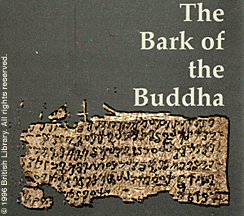

After working in this field for about 15 years, Salomon has established a good reputation--good enough to receive the inquiry from the British Library. "I was flattered. I happened to be working in a closely related field, but it never occurred to me that this is what it would lead to. The world is full of surprises and some of them are even good ones," he says.
Salomon sees several impacts from his research on the scholarly community at large and the UW. "For academic Buddhist studies, this finding could change the focus in many ways. The field of Gandharan studies could become a prominent field."
The discovery also will raise the profile of the UW Asian languages and literature program nationally and internationally, attracting more graduate students and creating a special study area within the department.
Salomon reflects on the change wrought in his quiet, scholarly pursuits: "My ivory tower has been blasted to bits, exposed to the world." Yet, perhaps as a result of his years of struggle to establish a career in an esoteric field, and perhaps from his exposure to the tenets of Buddhism itself, Salomon seems unfazed by his brush with fame. He has maintained a self-deprecating sense of humor and a sense of perspective, realizing that not everyone may be as interested in the subjects that fascinate him.
He pauses when asked if the study of Buddhism has influenced his own view of the world. "I am not a Buddhist in any sense. I have a lot of respect for it, but there are many things I will never understand and can't make part of myself or my beliefs. The part of my personal attitudes that have been influenced most strongly by Buddhism is the basic idea of `non-attachment.' In real Buddhism, the idea is taken to an extreme, where you give up your family and all material possessions, not something I'm likely to do.
"But the underlying point of that, of which I have a partial understanding, involves not clinging too tightly to things, to the material world A related idea is that of impermanence. Maybe it's just another way of becoming middle aged. People learn in one way or another that nothing lasts."
Richard Salomon's daily routine has changed. He has put the rest of his life on hold for the next year or two, as he and his colleagues work to prepare an introduction to the texts and to develop images of the documents that can be analyzed by other scholars. He has an urgent mission and he feels the pressure. And as he delves ever deeper into the texts, he runs the risks of again being thrust into the public eye.
So Richard Salomon, like the rhinoceros, maintains his distance from the world, even as it closes in on him.
* Bob Roseth is director of the UW Office of News and Information and a member of the Columns Advisory Committee. He is a graduate of MIT and the University of Missouri.
Return to the Beginning of "The Bark of the Buddha"
Send a letter to the editor at columns@u.washington.edu.